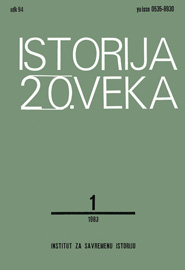RATNI CILJEVI SRBIJE I ITALIJA (1917)
THE WAR AIMS OF SERBIA AND ITALY (1917)
Author(s): Dragoljub ŽivojinovićSubject(s): Geography, Regional studies, Diplomatic history, Military history, Recent History (1900 till today), Pre-WW I & WW I (1900 -1919), Geopolitics
Published by: Institut za savremenu istoriju, Beograd
Keywords: Serbia; Italy; WWI; war aims; geopolitics; diplomacy; 1917;
Summary/Abstract: In this article the author argues that the Corfu Declaration, a program of the Yugoslav unification accepted in July 1917 by the Serbian Government and the Yugoslav Committee, had constituted the most critical point in the relations between Serbia and Italy during the World War. He points out to the Italian pretensions to the large stretches of the territory along the eastern Adriatic seaboard (Dalmatia, islands) inhabited predominantly by the South Slavs. It was not all. The Italian government also wanted a predominant influence in Albania as well as the preservation of an independent Montenegro. Such plans and pretensions ran contrary to the war aims of Serbia and the Yugoslav Committee. When confronted with the fact that the members of the Yugoslav Committee have arrived at Corfu, the Italian Foreign Minister, Sidney Sonnino, instructed Carlo Sforza, the Italian Minister at Corfu, to explore the possibility of bribing the members of the Yugoslav Committee, thus preventing the agreement with the Serbian Government. Sforza replied that it was not possible to achieve. Sonnino felt that the international set up (the fall of czarism, the entry of the United States into the war, Britain's efforts to induce Austria-Hungary to leave the war) seriously threatened prospective gains promised to Italy in the Pact of London. He absolutely refused to abandon any of these gains. Therefore, Sonnino conceived the Corfu Declaration as an additional act of sabotage directed against Italy and her interests. He said so to Nikola Pašić, the Serbian Prime Minister, adding that such a program was against Serbia’s interests as well. Pašić refused Sonnino’s contention, adding that he did not conceive the Declaration as an obstacle to eventual agreement between Serbia and Italy. Sonnino made Pašić and the Serbian Government responsible for the contents of the Corfu Declaration, insisting that it made Italy’s participation in the war useless, depreving her of any pretext to continuing to fight. The further discussions were interrupted for a long time to come.
Journal: Istorija 20. veka
- Issue Year: 1983
- Issue No: 1
- Page Range: 9-23
- Page Count: 15
- Language: Serbian

